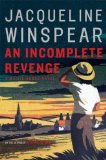Summary | Excerpt | Reviews | Beyond the book | Read-Alikes | Genres & Themes | Author Bio

A Prequel to the Charles Lennox Series
by Charles FinchCharles Finch's absorbing prequel to his popular Charles Lenox Mystery Series harkens back to 1850 when the Victorian gentleman was fresh out of Balliol College, Oxford.
Much to his father's chagrin, young Lenox is dead set on following his own path, eschewing the acceptable and customary military or political occupations normally attendant to the highborn. More than anything he desires a profession that is not merely new to him, but one that's virtually unknown to the world at large. It's seven months since graduation and things are not going well because he "was trying, against the better advice of nearly every soul he encountered, and so far with absolutely no success at all, to become something that did not exist: a private detective."
Over the previous several months he and his valet, Graham, have created a kind of archive of London crime. They have pored over every available newspaper, then snipped and filed articles reporting on crimes ranging from misdemeanor to murder. It is time-consuming labor at least and quasi-educational at best. But as training for the career Lenox is inventing for himself it seems as good as anything short of joining law enforcement, which he is not interested in doing.
One morning these journalistic sojourns pay off when a letter to the editor of a third-class newspaper catches the eye of both Lenox and Graham. In it, the anonymous author boasts of already having committed a "perfect crime" and announces plans to celebrate his triumph over "the sluggish energies of England's press and police" with an anniversary repeat performance. Lenox's sharp mind immediately makes a mental connection between this letter and the newspaper account of a murder almost a month previous.
The naked body of an as yet unidentified young woman had been found in a large trunk floating in the Thames. The case remains unsolved and Lenox is positive, from extrapolating certain clues, that yet another woman is in grave danger unless the police intervene. Alas, poor Lenox is somewhat of a laughingstock among the denizens of Scotland Yard (see Beyond the Book) who see him more as a fancy-pants dilettante than a serious professional.
Despite his best efforts, he is hard pressed to make an impression before a second body is discovered along the banks of the Thames. This time the woman is found lying on a large plank, she is clothed in a white dress, heavily made up and festooned with flowers. Scotland Yard has little choice but to take him seriously now so Lenox and, by association, Graham are retained but with strict boundaries.
Finch's amateur sleuth has all the unbridled eagerness of youth as he devotes just about every waking moment to solving the murders, remaining consistently one jump ahead of the police. He does all this despite partying a little too much and suffering the heartbreak of loving a married woman. And even though he's the spare not the heir, his father's fatal illness affects him deeply, bringing him closer to his elder brother.
For me there are two sure signs that I've gotten completely absorbed in a book. One is the number of coffee-stained pages and the second - disaster for a critic expected to take notes - is the sudden absence of anything jotted down in the margins. The Woman in the Water bears all the telltale marks of my immersion into 1850 London. This is my first Charles Lenox Mystery but it won't be my last.
![]() This review was originally published in The BookBrowse Review in April 2018, and has been updated for the
January 2019 edition.
Click here to go to this issue.
This review was originally published in The BookBrowse Review in April 2018, and has been updated for the
January 2019 edition.
Click here to go to this issue.

If you liked The Woman in the Water, try these:

by David Morrell
Published 2017
The notorious Opium-Eater returns in the sensational climax to David Morrell's acclaimed Victorian mystery trilogy.

by Jacqueline Winspear
Published 2008
In her fifth outing, Maisie Dobbs, the extraordinary Psychologist and Investigator, delves into a strange series of crimes in a small rural community.
Your guide toexceptional books
BookBrowse seeks out and recommends the best in contemporary fiction and nonfiction—books that not only engage and entertain but also deepen our understanding of ourselves and the world around us.